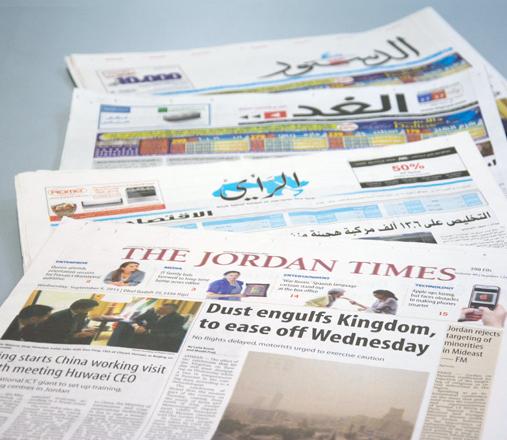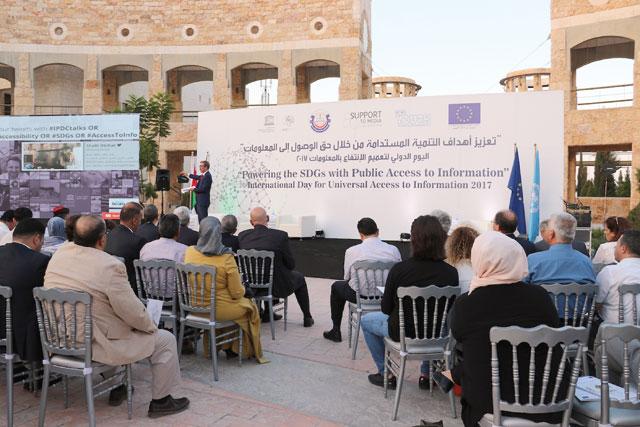You are here
Media insiders call for constitutionalising access to information
By Mohammad Ghazal - May 09,2016 - Last updated at May 09,2016

HRH Princess Rym Ali attends a ceremony in Amman on Sunday marking the World Press Freedom Day (Petra photo)
AMMAN — Constitutionalising access to information in Jordan would help guarantee this right effectively and eventually lead to more media freedoms, media insiders said.
The media experts called for fundamental changes to the Access to Information Law as the government pledged continued reforms of media-related legislation to enhance information availability and press freedom.
Out of 108 countries that have access to information laws, the Kingdom's version, introduced in 2007, ranks 98th, Toby Mendel, media law international expert and UNESCO consultant, said at panel marking the World Press Freedom Day on Sunday.
"It is something to be proud of that Jordan was the first in the region to have such a law, but there needs to be some more work done on this law," Mendel said at the celebration held by UNESCO in collaboration with the EU and in the presence of HRH Princess Rym Ali, the founder of the Jordan Media Institute.
Describing the law as ineffective, Mosab Shawabkeh, manager of the investigative journalism unit at Radio Al Balad, called for constitutionalising access to information.
"The government always takes pride in saying it was the first to have a law that guarantees access to information, while it actually works on blocking access to information via many ways," Shawabkeh charged.
On the other hand, Deputy Kholoud Khatatbeh, chair of the Lower House media and national guidance committee, said the law is excellent and Jordan should take pride in it.
Khatatbeh added that the draft amendments to the law that are under discussion include shortening the 30-day response period to 15 in addition to other "good changes".
The lawmaker said that of the total number of those who use the law to obtain information only 3 per cent are journalists, while the rest are researchers.
"Journalists are not convinced in using the law because it does not make it obligatory for officials to respond," she added.
For his part, Minister of State for Media Affairs and Communications Mohammad Momani defended the government's keenness to protect press freedom and access to information.
"We live in an age where it is impossible to hide information from the public, but we are keen on regulating the process," Momani said at the panel.
The minister said civil servants' hesitance and fear of giving information is one of the key issues that affect the process.
"Civil servants need more training because sometimes they are afraid of penalties or consequences if they give information," Momani, who is also government spokesperson, said.
"They might be afraid that the information they give will cause a problem and, therefore, they avoid giving information to avoid trouble," said the minister, stressing that some media practitioners sometimes do not "understand the sensitivity of the information they ask for".
In a speech at the event, UNESCO Representative to Jordan Costanza Farina said access to information is a basic human right that will help ensure the fulfilment of the Sustainable Development Goals (SDGs).
"Free media is crucial to advance the SDGs," she said, adding that goal 16 is dedicated to the promotion of peaceful and inclusive societies for sustainable development, the provision of access to justice for all, and building effective, accountable institutions at all levels.
It seeks to ensure public access to information and protect fundamental freedoms, in accordance with national legislation and international agreements.
Related Articles
AMMAN — Judicial officers, journalists, civil society activists, parliamentarians, lawyers and access to information regulatory bodies joine
AMMAN — To improve its standing on media freedoms, Jordan needs to amend a wide set of related laws, indicated UNESCO on Tuesday, as the gov
AMMAN — UNESCO Amman Office on Wednesday celebrated the International Day for the Universal Access to Information (IDUAI) at the Jordan Univ

















